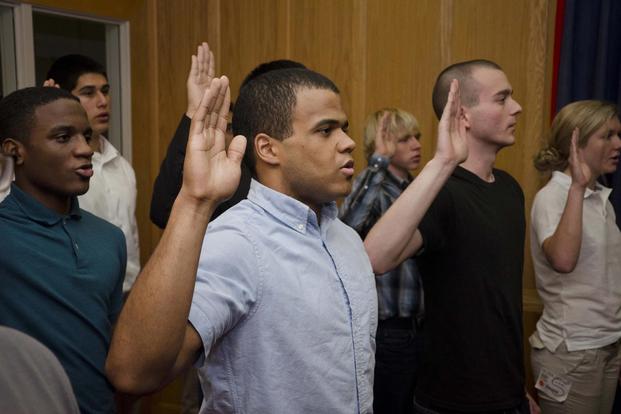More than 800 foreign-born prospective Marines will soon ship off to boot camp, despite reports that the Army is discharging immigrant soldiers who'd followed a similar path to military service in hopes of becoming U.S. citizens.
The Marine Corps is still processing applicants with lawful permanent resident status, Gunnery Sgt. Justin Kronenberg, a spokesman for Marine Corps Recruiting Command, told Military.com.
There are currently about 830 men and women born outside the U.S. in the Corps' delayed-entry program.
"The Marine Corps has not discharged any of them due to excessive time in the pool awaiting suitability determinations," Kronenberg said.
Those in the delayed-entry program have signed enlistment agreements and train for boot camp with their recruiters and other prospective Marines. They're typically in the program for several weeks or months.
Last week, The Associated Press reported the Army was quietly booting dozens of soldiers who'd joined the military and completed entry-level training with the promise that they'd qualify for U.S. citizenship. The story added new fuel to a heated ongoing debate over immigration.
Those soldiers joined as part of the Military Accessions Vital to the National Interest program, or MAVNI, which started under President George W. Bush and was designed to help the military attract health care professionals or personnel with specific language skills.
An estimated 10,400 troops signed up to serve through that program, but none were Marines. The Marine Corps opted not to participate in the program, Kronenberg said.
"The Marine Corps does not have any medical occupational field and we do not have the type of shortfalls in language proficiencies that would necessitate participation in MAVNI," he said.
The Marine Corps isn't the only service to have opted out of the program.
The Coast Guard continues to admit immigrants who read, write and speak English fluently; are admitted to the U.S. as lawful permanent residents; and have no prior military service, said Chief Warrant Officer 3 Chad Saylor with Coast Guard media relations.
The service has no plans to review that policy, he said.
"However, in order to re-enlist in the Coast Guard or Coast Guard Reserve, the member must become a U.S. citizen," Saylor added.
The Navy didn’t respond to questions about its program and whether any sailors are facing discharge before press time.
The Air Force doesn’t currently participate in MAVNI, according to a service spokeswoman, and "the issue highlighted by the AP story doesn't affect us."
That’s true, she said, even though the Air Force did participate in the program until 2016.
Members of the Marine Corps' delayed-entry program must complete all security and suitability screening requirements before they can ship off to boot camp. After 180 consecutive days on active duty, they can qualify for honorable service, which allows them to expedite the naturalization process.
That's a Defense Department policy, Kronenberg said. Some new Marines qualify to take the Oath of Allegiance to become U.S. citizens immediately following the end of boot camp.
Officials with Marine Corps Recruiting Command take steps to ensure lawful permanent residents have enough time in the delayed-entry program to meet all of the determinations for military service before they ship off to boot camp, Kronenberg said.
"[We] work closely with DoD to ensure we keep faith with those who meet enlistment eligibility requirements and share our fighting spirit," he said. "We continuously evaluate our policies to ensure they are fair and equitable."
-- Editor’s note: This story was updated to more accurately describe the Air Force’s participation in the MAVNI program.
--Oriana Pawlyk contributed to this report.
-- Gina Harkins can be reached at gina.harkins@military.com. Follow her on Twitter @ginaaharkins.












